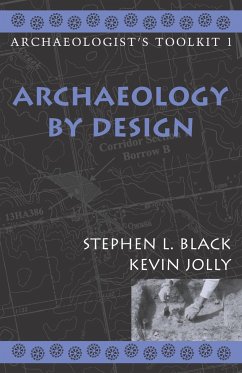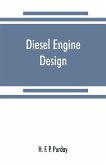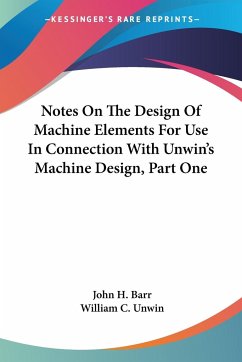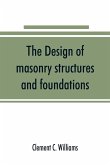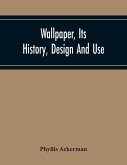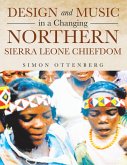- Broschiertes Buch
- Merkliste
- Auf die Merkliste
- Bewerten Bewerten
- Teilen
- Produkt teilen
- Produkterinnerung
- Produkterinnerung
Introduction to designing an archaeological project, in both academic and contract contexts.
Andere Kunden interessierten sich auch für
![Progressive design for students Progressive design for students]() James WardProgressive design for students21,99 €
James WardProgressive design for students21,99 €![The Design of the University The Design of the University]() Heinz-Dieter MeyerThe Design of the University54,99 €
Heinz-Dieter MeyerThe Design of the University54,99 €![Diesel engine design Diesel engine design]() H. F. P. PurdayDiesel engine design27,99 €
H. F. P. PurdayDiesel engine design27,99 €![Notes On The Design Of Machine Elements For Use In Connection With Unwin's Machine Design, Part One Notes On The Design Of Machine Elements For Use In Connection With Unwin's Machine Design, Part One]() John H. BarrNotes On The Design Of Machine Elements For Use In Connection With Unwin's Machine Design, Part One28,99 €
John H. BarrNotes On The Design Of Machine Elements For Use In Connection With Unwin's Machine Design, Part One28,99 €![The design of masonry structures and foundations The design of masonry structures and foundations]() Clement C. WilliamsThe design of masonry structures and foundations35,99 €
Clement C. WilliamsThe design of masonry structures and foundations35,99 €![Wallpaper, Its History, Design And Use Wallpaper, Its History, Design And Use]() Phyllis AckermanWallpaper, Its History, Design And Use36,99 €
Phyllis AckermanWallpaper, Its History, Design And Use36,99 €![Design and Music in a Changing Northern Sierra Leone Chiefdom Design and Music in a Changing Northern Sierra Leone Chiefdom]() Simon OttenbergDesign and Music in a Changing Northern Sierra Leone Chiefdom64,99 €
Simon OttenbergDesign and Music in a Changing Northern Sierra Leone Chiefdom64,99 €-
-
-
Introduction to designing an archaeological project, in both academic and contract contexts.
Hinweis: Dieser Artikel kann nur an eine deutsche Lieferadresse ausgeliefert werden.
Hinweis: Dieser Artikel kann nur an eine deutsche Lieferadresse ausgeliefert werden.
Produktdetails
- Produktdetails
- Verlag: Altamira Press
- Seitenzahl: 200
- Erscheinungstermin: 1. Januar 2003
- Englisch
- Abmessung: 235mm x 161mm x 17mm
- Gewicht: 399g
- ISBN-13: 9780759103979
- ISBN-10: 0759103976
- Artikelnr.: 21034827
- Herstellerkennzeichnung
- Produktsicherheitsverantwortliche/r
- Europaallee 1
- 36244 Bad Hersfeld
- gpsr@libri.de
- Verlag: Altamira Press
- Seitenzahl: 200
- Erscheinungstermin: 1. Januar 2003
- Englisch
- Abmessung: 235mm x 161mm x 17mm
- Gewicht: 399g
- ISBN-13: 9780759103979
- ISBN-10: 0759103976
- Artikelnr.: 21034827
- Herstellerkennzeichnung
- Produktsicherheitsverantwortliche/r
- Europaallee 1
- 36244 Bad Hersfeld
- gpsr@libri.de
Stephen L. Black is a research associate and editor of www.TexasBeyondHistory.net at the Texas Archeological Research Laboratory at the University of Texas at Austin. Kevin Jolly is a research fellow of the Texas Archeological Research Laboratory at the University of Texas at Austin and the director of development at RW3 Technologies Inc.
Part 1 Series Editors' Foreword Part 2 1 Designing Archaeological Research with an Attitude Chapter 3 The Process of Designing Archaeological Research
Professional Archaeological Research
Why Design Archaeological Research?
The Cost of Archaeology
Your Obligation to the Public
Archaeology by Default
Designing Research is Archaeology Part 4 2 Building Your Professional Toolkit Chapter 5 Anthropological Archaeology
Current Archaeological Method and Theory
Multidisciplinary Studies
Keeping Current
Developing Regional Expertise
Navigating the Political Playing Field
Why the Professional Archaeologist's Toolkit is Heavy Part 6 3 A Quick Look at the Research Process Chapter 7 The "Pure" Research Process in Academic Archaeology
The "Directed" Research Process in CRM Archaeology
The Parts of CRM Research
Conclusion Part 8 4 The Scope of Work Chapter 9 The Project Area
The Work
Work Standards
Time
Money
Logistics
Conclusion Part 10 5 Research Questions Chapter 11 Typical Approaches to Archaeological Research
Creating Research Questions
Sources of Questions Part 12 6 Developing Your Research Strategy Chapter 13 Think First, Dig Later-Archaeological Strategy
Making Tough Choices-Operational Strategy
Conclusion Part 14 7 The Written Research Design Chapter 15 Whom Are You Writing For?
Projects Big and Small
Critical Components of Your Written Research Design
Additional Considerations
Conclusion Part 16 8 Putting Your Research Design to Work Chapter 17 Implementing Your Research Design
In from the Cold
Evaluating Your Research Design
Now It's Up to You Part 18 Appendix A. Groups You Should Join Part 19 Appendix B. Journals You Should Read Part 20 Appendix C. The ABCs of CRM Part 21 Appendix D. The Logistics Checklist Part 22 References Part 23 Index Part 24 About the Authors and Series Editors
Professional Archaeological Research
Why Design Archaeological Research?
The Cost of Archaeology
Your Obligation to the Public
Archaeology by Default
Designing Research is Archaeology Part 4 2 Building Your Professional Toolkit Chapter 5 Anthropological Archaeology
Current Archaeological Method and Theory
Multidisciplinary Studies
Keeping Current
Developing Regional Expertise
Navigating the Political Playing Field
Why the Professional Archaeologist's Toolkit is Heavy Part 6 3 A Quick Look at the Research Process Chapter 7 The "Pure" Research Process in Academic Archaeology
The "Directed" Research Process in CRM Archaeology
The Parts of CRM Research
Conclusion Part 8 4 The Scope of Work Chapter 9 The Project Area
The Work
Work Standards
Time
Money
Logistics
Conclusion Part 10 5 Research Questions Chapter 11 Typical Approaches to Archaeological Research
Creating Research Questions
Sources of Questions Part 12 6 Developing Your Research Strategy Chapter 13 Think First, Dig Later-Archaeological Strategy
Making Tough Choices-Operational Strategy
Conclusion Part 14 7 The Written Research Design Chapter 15 Whom Are You Writing For?
Projects Big and Small
Critical Components of Your Written Research Design
Additional Considerations
Conclusion Part 16 8 Putting Your Research Design to Work Chapter 17 Implementing Your Research Design
In from the Cold
Evaluating Your Research Design
Now It's Up to You Part 18 Appendix A. Groups You Should Join Part 19 Appendix B. Journals You Should Read Part 20 Appendix C. The ABCs of CRM Part 21 Appendix D. The Logistics Checklist Part 22 References Part 23 Index Part 24 About the Authors and Series Editors
Part 1 Series Editors' Foreword Part 2 1 Designing Archaeological Research with an Attitude Chapter 3 The Process of Designing Archaeological Research
Professional Archaeological Research
Why Design Archaeological Research?
The Cost of Archaeology
Your Obligation to the Public
Archaeology by Default
Designing Research is Archaeology Part 4 2 Building Your Professional Toolkit Chapter 5 Anthropological Archaeology
Current Archaeological Method and Theory
Multidisciplinary Studies
Keeping Current
Developing Regional Expertise
Navigating the Political Playing Field
Why the Professional Archaeologist's Toolkit is Heavy Part 6 3 A Quick Look at the Research Process Chapter 7 The "Pure" Research Process in Academic Archaeology
The "Directed" Research Process in CRM Archaeology
The Parts of CRM Research
Conclusion Part 8 4 The Scope of Work Chapter 9 The Project Area
The Work
Work Standards
Time
Money
Logistics
Conclusion Part 10 5 Research Questions Chapter 11 Typical Approaches to Archaeological Research
Creating Research Questions
Sources of Questions Part 12 6 Developing Your Research Strategy Chapter 13 Think First, Dig Later-Archaeological Strategy
Making Tough Choices-Operational Strategy
Conclusion Part 14 7 The Written Research Design Chapter 15 Whom Are You Writing For?
Projects Big and Small
Critical Components of Your Written Research Design
Additional Considerations
Conclusion Part 16 8 Putting Your Research Design to Work Chapter 17 Implementing Your Research Design
In from the Cold
Evaluating Your Research Design
Now It's Up to You Part 18 Appendix A. Groups You Should Join Part 19 Appendix B. Journals You Should Read Part 20 Appendix C. The ABCs of CRM Part 21 Appendix D. The Logistics Checklist Part 22 References Part 23 Index Part 24 About the Authors and Series Editors
Professional Archaeological Research
Why Design Archaeological Research?
The Cost of Archaeology
Your Obligation to the Public
Archaeology by Default
Designing Research is Archaeology Part 4 2 Building Your Professional Toolkit Chapter 5 Anthropological Archaeology
Current Archaeological Method and Theory
Multidisciplinary Studies
Keeping Current
Developing Regional Expertise
Navigating the Political Playing Field
Why the Professional Archaeologist's Toolkit is Heavy Part 6 3 A Quick Look at the Research Process Chapter 7 The "Pure" Research Process in Academic Archaeology
The "Directed" Research Process in CRM Archaeology
The Parts of CRM Research
Conclusion Part 8 4 The Scope of Work Chapter 9 The Project Area
The Work
Work Standards
Time
Money
Logistics
Conclusion Part 10 5 Research Questions Chapter 11 Typical Approaches to Archaeological Research
Creating Research Questions
Sources of Questions Part 12 6 Developing Your Research Strategy Chapter 13 Think First, Dig Later-Archaeological Strategy
Making Tough Choices-Operational Strategy
Conclusion Part 14 7 The Written Research Design Chapter 15 Whom Are You Writing For?
Projects Big and Small
Critical Components of Your Written Research Design
Additional Considerations
Conclusion Part 16 8 Putting Your Research Design to Work Chapter 17 Implementing Your Research Design
In from the Cold
Evaluating Your Research Design
Now It's Up to You Part 18 Appendix A. Groups You Should Join Part 19 Appendix B. Journals You Should Read Part 20 Appendix C. The ABCs of CRM Part 21 Appendix D. The Logistics Checklist Part 22 References Part 23 Index Part 24 About the Authors and Series Editors

